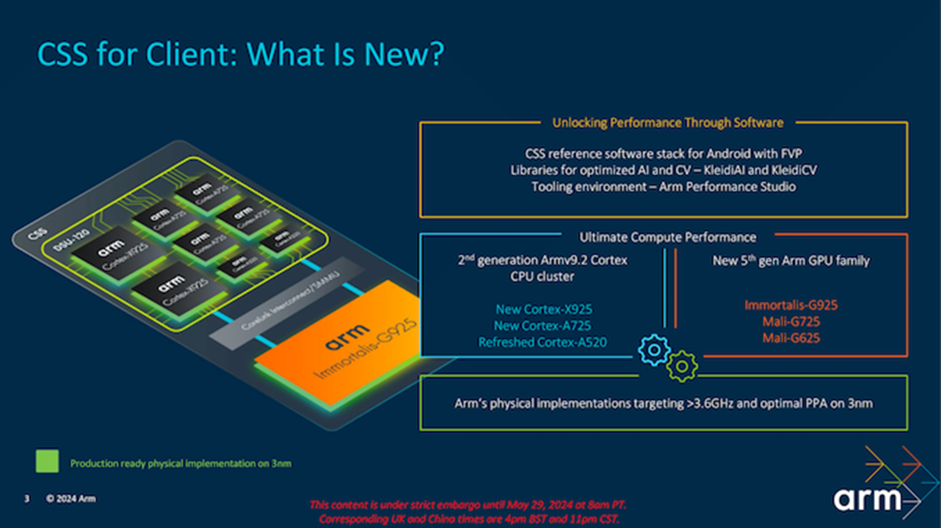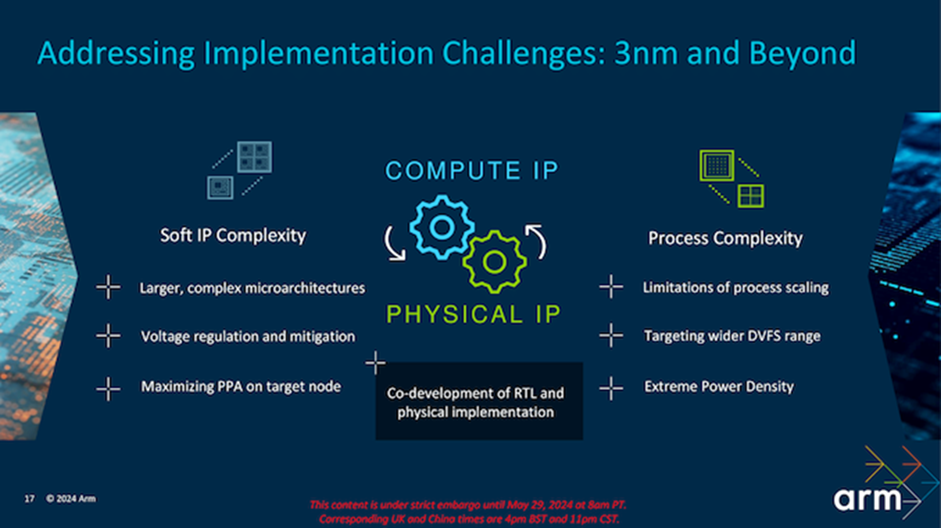Arm has launched the Arm Compute Subsystems (CSS) for Client, integrating Armv9 with Arm CPUs and GPUs on 3nm process nodes. The CSS aims to help silicon partners accelerate time to market and achieve performance improvements in compute, graphics, and AI inference. The platform includes Cortex-X925 CPU and Immortalis-G925 GPU for mobile devices. Partners like MediaTek and Samsung Electronics have expressed commitment to integrating these solutions in their upcoming products.

What we think? Arm has an amazing AI attach rate but so far has middling AI acceleration IPs. CSS addresses that to some extent, while also packaging IP in a way that enables customers to get to market faster and be in the market longer. What is missing from the latest offering is an NPU, but there is a separate Neoverse CSS already, and potentially Arm is looking at targeting that at 3nm to match this new offer—or at introducing new AI acceleration technology, which is what we expect.
Is it a step towards providing harder IP, or even chiplets? Only Arm can say for sure, but we suspect so given the amount of money Arm is putting into developing a chip team. Right now, they are talking in terms of RTL and physical implementation being “co-developed.” If they want to win customers over to that idea, then providing high-quality 3nm targeted cores is a smart first step.
For thoughts on a potential customer, see our other article here.
Arm packages IP for quick implementation for AI
Arm has introduced the Arm Compute Subsystems (CSS) for Client, combining Armv9 with production-ready implementations of Arm CPUs and GPUs on 3nm process nodes (theoretically process agnostic, though Arm is recommending TSMC and Samsung). Thematically you should consider CSS a successor to the older TCS (Total Compute Systems) offering.
The plan is to enable silicon partners to reduce time to market.
Arm says real-life workloads show over 30% increases in compute and graphics performance and 59% faster AI inference.
The CSS for Client platform includes the Cortex-X925 CPU, which Arm says provides a 36% single-thread performance increase and a 41% AI performance uplift. The Cortex-A725 CPU delivers a claimed 35% improvement in performance efficiency for AI and mobile gaming use cases. Additionally, the Immortalis-G925 GPU offers a claimed 37% more performance for mobile gaming and 34% more for AI and ML networks. Given the cores involved, this offering stretches across mobile, tablet, and laptop devices. Safety standardization for automotive isn’t mentioned.

Said JC Hsu, corporate senior vice president at MediaTek: “MediaTek is committed to supporting the latest Armv9 Cortex-X925 CPU and Immortalis-G925 GPU client solution in our next-generation flagship chipset, Dimensity 9400, later this year. As part of our long-standing relationship with Arm, we will continue to work together to enable the future of computing technology as it accelerates in features and capabilities.”
To support developer innovation, Arm has introduced Kleidi, which includes KleidiAI for AI workloads and KleidiCV for computer vision applications. KleidiAI offers compute kernels that integrate with popular AI frameworks to optimize performance on Arm CPUs and support key Arm architectural features. Kleidi suggests that the main target for these cores will be Android devices.

Said Jongwook Kye, executive vice president and head of foundry design platform development at Samsung Electronics: “GenAI capabilities embedded in mobile devices are in major demand amongst customers, requiring top-tier silicon technologies integrated with leading computing solutions. Combining Arm’s Cortex-X925 CPU solutions with Samsung Foundry’s latest 3nm GAA process node delivers on this demand. Our long-standing partnership with Arm allowed for early and tight collaboration in the areas of DTCO and PPA maximization for an on-time silicon delivery that hit performance and efficiency demands.”
Overall, CSS for Client combined with Kleidi software provides a robust compute platform for the future of AI, leveraging advanced CPU and GPU technologies, production-ready implementations, and continuous software optimizations.